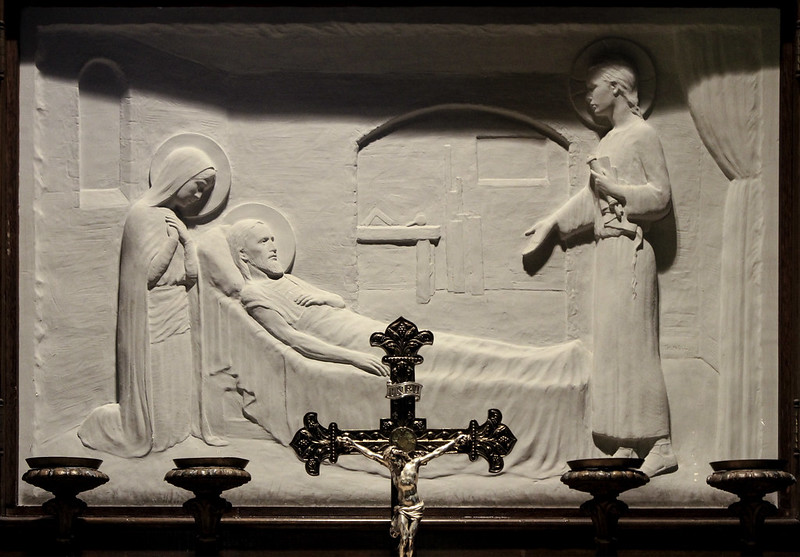Editor’s Note: The following are excerpts taken from and article in Dominicana vol. 1, no. 5, published at the House of Studies in March of 1917. Written by James Dalmatius Enright, O.P. (1895–1970), the article is, by our accounts, the first full-length piece in Dominicana to treat Saint Joseph. Today, on the Solemnity of the patron of our province, we ask for St. Joseph’s continued intercession for all his sons, especially at the hour of death.
Of all the personages mentioned in the Sacred Scriptures, there is none concerning whose life we have fewer details than that of Saint Joseph, the Spouse of the Blessed Virgin, and Foster Father of Our Lord Jesus Christ. It is from the Gospel we know these few details of his life—that he was of the House of David, of the Tribe of Juda, and “a just man.”
The just man is one of the most perfect of scriptural characters—one who walks with God, whose life is blameless, full of kindness and gentleness. The just man considers no sacrifice too great to serve God, for all his thoughts and desires are for His greater honor and glory. The Holy Scripture tells us “the desire of the just man is all good” (Prov. 11:23). “The blessing of the Lord is on the head of the just” (Prov. 10:6). “The just man shall be in everlasting remembrance” (Ps. 111:7). From these few words we can easily understand how God would never have chosen Saint Joseph for that high place which he filled so conscientiously, had his character been otherwise than spotless.
The greatness of Saint Joseph did not consist of those brilliant qualities which the world admires. He was not called like Abraham to be the father of a great nation; neither was he called like David and Solomon to rule cities, to give laws to nations, to build a great temple, or to admonish the world by his wisdom. Like the Prophets, he did not open the eyes of the blind and perform other great miracles. His great perfection simply consisted in the faithful performance of the ordinary duties of every-day life. Saint Joseph, reduced to the most lowly condition, accepted without a murmur the order of Almighty God. He did not oppose His incomprehensible judgments and unsearchable ways, but was contented and happy in his poverty because such was the will of God. . . .
Saint Joseph, who, next to the Blessed Virgin is raised above all other saints in heaven, is a powerful protector against the attacks of the devil at the hour of death. And for this reason we should love and reverence him during life. What does it mean to have a protector and helper to come to our assistance in some grave necessity? We all know that as long as we enjoy prosperity we need not seek long for friends. They will come in troops of their own accord. But if the time of adversity comes upon us the most of our so-called friends will abandon us. Then we shall easily find out who are our true friends, and then, probably for the first time, we shall realize the truth of the proverb, “A friend in need is a friend indeed.” Suppose, however, we find a friend whose sense of honor is upright in this respect, and who like a true friend stands by us in our necessity. Where in all this world shall we find any one to help us in the most dangerous of all plights—namely, the hour of our death? There is no one on this earth, no matter how near and dear to us, who can protect us then. Our relatives and friends may stay near us; they may shed tears; they may grieve; but they cannot go with us into eternity and plead our cause before our Judge. Saint Joseph, whose feast we celebrate on the 19th of March, is such a helper. For long centuries past the Church has venerated him as the patron of a holy death, and each successive March presents him to her children as a perfect model of the virtues she desires them to practise. The month is set apart that they may know that a tender devotion to Saint Joseph is a great security in one’s last moments. . . .
Let us seek to know more and more of Saint Joseph. Let no day pass without some little prayer to him. And when the hour of trial, temptation, or even death comes, if we call on him he will hear us, he will assist us.
-Dalmatius Enright, O.P.
✠
Image: Thomas Matthew McGlynn, O.P., The Death of Saint Joseph, located in the St. Joseph Chapel at the Dominican House of Studies, Washington (photo by Fr. Lawrence Lew, OP.; used with permission)







